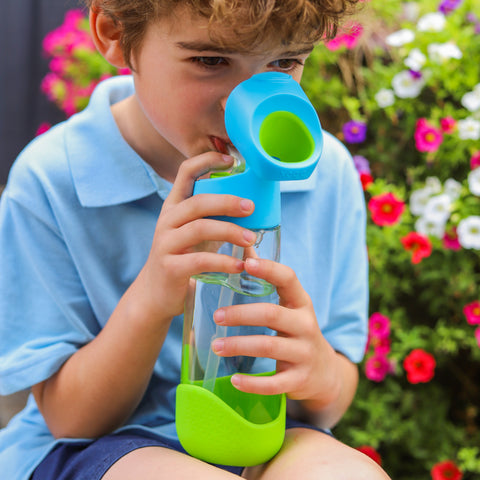As the weather gets warmer, especially here in Malta where we barely have two days of Spring and its suddenly already summer, the need to keep hydrated and safe from the sun becomes top priority. There are children like my daughter who carry their water bottle everywhere with them when out, or even from room to room when at home. There are others who don't like to drink water so we have to push them a little or at least monitor them.
So what's the big deal about keeping hydrated?
The importance of drinking water is emphasized all year round, not just in summer, and this is because water makes up about 70% of our body. It is required for proper functioning of most internal processes such as regulating our body temperature, carrying nutrients and oxygen to cells, helping in cleaning out waste products, keeping joints lubricated and skin moisturised, and helping digestion and preventing constipation. We cannot survive more than a few days without water, so all this hype about drinking enough water is not just hype, its important for optimal functioning of the body. During the summer months, or increased physical activity, the demand for fluids increases.

How much water should they be drinking?
These are the approximate recommendations for daily fluid intake:
- Infants 0-6 months: strictly breastmilk or formula milk
- Infants 7-12 months: 650-800ml (mixture of milk and water)
- Toddlers 1-2 years: 880-1000ml
- Children 2-3 years: 1100ml
- Children 4-8 years: 1300ml
- Boys 9-13 years: 1600ml
- Girls 9-13 years: 1500ml
- Over 13 years: 2 litres
Having a reusable bottle with fresh drinking water readily available at all times, will make it easier to reach these targets. For summer school, I always pack 2 bottles for my daughter, one of which is insulated. At home, I prepare 2-3 bottles of water in the kitchen or fridge so that she can always find it readily available.

Signs of dehydration in children
Infants and young children are especially susceptible to dehydration because they have high water requirements compared to their body size and because they don’t always recognize their thirst cues early on. Even mild dehydration can make a child feel tired and irritable, and may also cause headache, lack of concentration, reduced mental performance and dry skin. Other signs of Severe dehydration include:
- Lethargy and drowsiness
- Dry mouth
- Pale face
- Cold hands and feet
- Rapid breathing
- Confusion
- Dark and sunken eyes
- Dark urine
Does it have to be water?
If water is offered early on as the main refreshment, children will get used to drinking water alone. If you are past this stage and your child doesn’t like water alone, try adding fresh fruit, vegetables and/or herbs to water in a glass pitcher. eg oranges, lemons, berries, cucumber and mint. Let the water infuse for 30 minutes before serving.
Fruit juices and milk should be limited and served at mealtimes because of the free sugar. Other acidic drinks such as fizzy drinks and squashes, should be avoided completely. These drinks can lead to tooth decay and excess calories, and will also develop the child’s preference for over-sweet drinks.
Some foods are also a good source of fluids and contribute to fluid intake, such as:
- water rich fruits eg watermelon, strawberries, cantaloupe, peaches, oranges
- water rich vegetables eg cucumber, lettuce, zucchini, celery, bell peppers, tomatoes
- milk
- soups and broths
- ice lollies
- jelly
- yoghurt
- coconut water
- cottage cheese

SUMMARY: How can I encourage my child to drink more water?
- Be a role model and keep up your water intake yourself
- Offer a glass of water regularly until your child gets used to doing it: in the morning before school, after physical activity, before and during playtime, etc
- Offer more water when weather is warm/hot, preferably in an insulated bottle to make it more palatable.
- Pack reusable bottles of water to have water available whether they are at school, childcare, or out with you.
- Let your child choose their cup or water bottle to encourage them to use it more.
- Offer foods high in water content
- If they are not keen on water, add fruit slices to give it a little flavour, but keep offering plain water repeatedly to get them used to it.

References:
